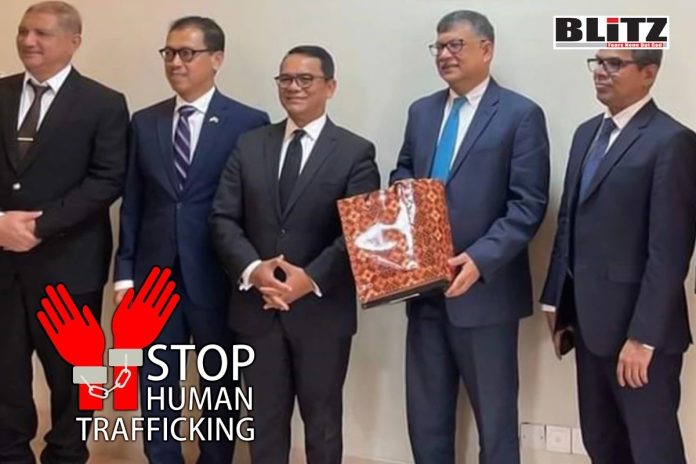In the ongoing battle against human trafficking, forging strong partnerships and fostering international cooperation are indispensable. Such principles were reaffirmed during a pivotal meeting between the Bali Process on People Smuggling, Trafficking in Persons, and Related Transnational Crime, represented by Co-Chairs Ambassador Lynn Bell from Australia and Ambassador Tri Tharyat from Indonesia, and Bangladeshi officials led by Foreign Secretary Ambassador Masud Bin Momen and Secretary Md. Ruhul Amin at the Ministry of Foreign Affairs on March 18, 2024. This meeting served as a testament to the shared determination to combat human trafficking and its associated crimes through collaborative and sustainable strategies.
Established in 2002, the Bali Process serves as a pivotal international platform committed to fostering cooperation, facilitating information exchange, and devising policies to counteract irregular migration across the Asia-Pacific region and globally. Spanning across 45 nations across diverse continents and incorporating observer states and organizations, the Bali Process offers a robust framework for governments, practitioners, and experts to collaboratively combat the menace of human trafficking. Through this expansive membership, the Bali Process champions concerted efforts to address the multifaceted challenges posed by irregular migration and trafficking in persons.
During the recent high-level discussions, the Foreign Secretary of Bangladesh underscored the government’s unwavering commitment and ‘zero tolerance’ stance against human trafficking. Emphasizing the multifaceted nature of this criminal enterprise and the inherent challenges in effectively combating it, the Secretary stressed the imperative for sustainable approaches and concerted efforts. The delegation was briefed on Bangladesh’s extensive programs and initiatives aimed at reintegrating trafficking victims, bolstered by support from development partners, underscoring the nation’s comprehensive approach to addressing this pressing issue.
In alignment with these perspectives, the Co-chairs of the Bali Process reaffirmed the imperative for robust collaboration in combating the intricate network of human trafficking. They voiced profound apprehension regarding the heightened irregular migrations among forcibly displaced individuals from Myanmar, stressing the pressing need for concerted efforts to tackle this humanitarian emergency. Of particular concern was the Rohingya crisis, underscored for its extensive ramifications on the economic, societal, environmental, and security landscapes of Bangladesh and the wider region. Such a situation underscores the urgency for a unified and coordinated response to effectively address these multifaceted challenges.
Bangladesh’s steadfast commitment to combatting human trafficking has been underscored by intensified law enforcement efforts. The enactment of the Prevention and Suppression of Human Trafficking Act (PSHTA) in 2012 marked a significant milestone, criminalizing both sex trafficking and labor trafficking and imposing stringent penalties on perpetrators. Notably, the establishment of Anti-Human Trafficking Tribunals across the country has led to an increase in prosecutions and convictions related to human trafficking, reflecting Bangladesh’s unwavering resolve to hold traffickers accountable and deliver justice for victims.
The recent dialogue between the Bali Process and Bangladeshi authorities underscores a mutual dedication to comprehensively combatting human trafficking. Deliberations accentuated the necessity of embracing a ‘zero tolerance’ approach, implementing enduring strategies, and nurturing collaboration among member states. Bangladesh’s proactive endeavors in reintegrating victims and its apprehensions regarding displaced Myanmar nationals highlight the pressing call for collective action to effectively tackle trafficking and its associated crimes. This collective commitment underscores a shared resolve to confront the scourge of human trafficking head-on, emphasizing the importance of sustained cooperation and coordinated efforts to safeguard the rights and dignity of vulnerable individuals across borders.
Furthermore, efforts geared towards bolstering law enforcement capabilities and bolstering social awareness initiatives illustrate Bangladesh’s comprehensive strategy in combating human trafficking. By tackling the underlying causes and repercussions of trafficking, Bangladesh endeavors to foster a safer and more secure environment for its populace. Simultaneously, these endeavors contribute significantly to the worldwide campaign against this egregious infringement of human rights, showcasing Bangladesh’s commitment to upholding dignity and justice for all individuals.
The recent convening between the Bali Process and Bangladeshi officials marks a pivotal advancement in the global battle against human trafficking. By fostering enduring collaboration and united efforts, the international community can collectively strive to eliminate this reprehensible crime. Through such sustained actions, justice can be ensured for victims, and the fundamental dignity and rights of all individuals can be safeguarded. This moment serves as a testament to the shared determination to combat trafficking and uphold human rights on a global scale.




